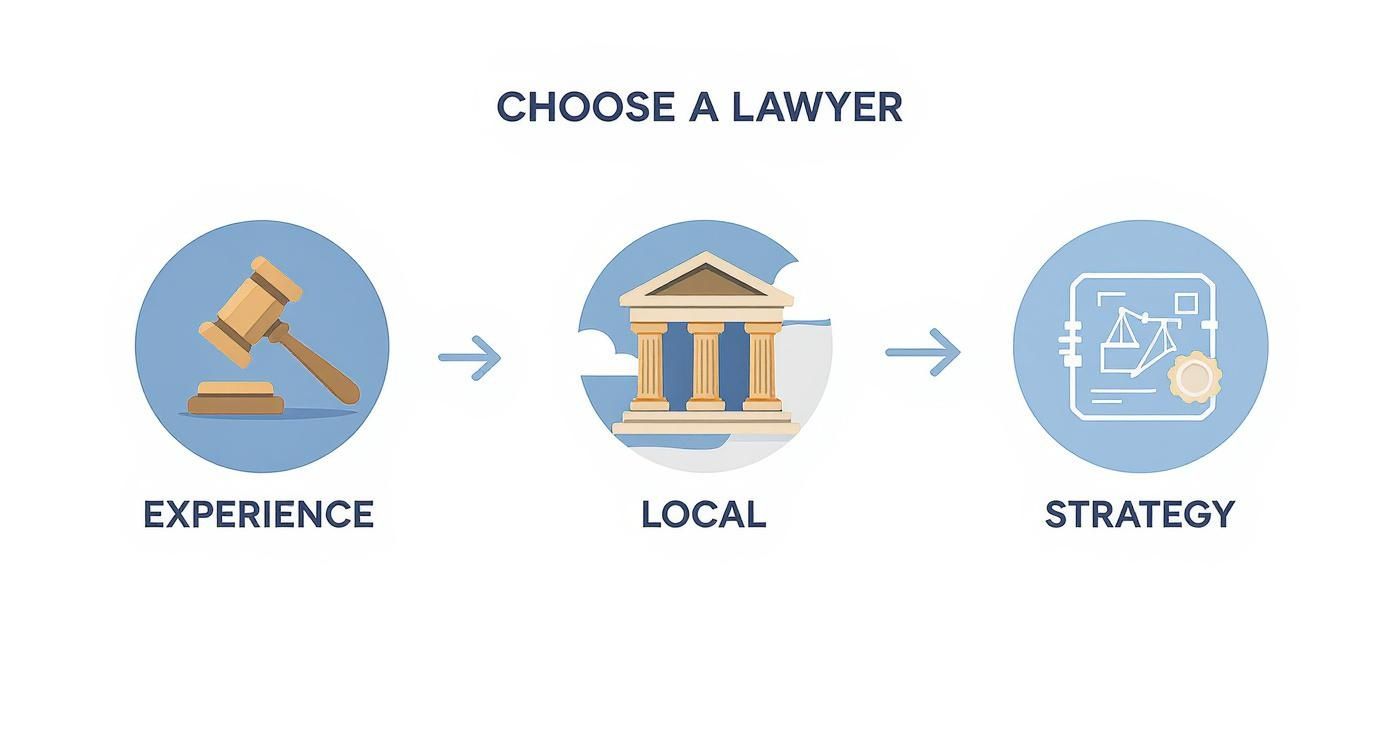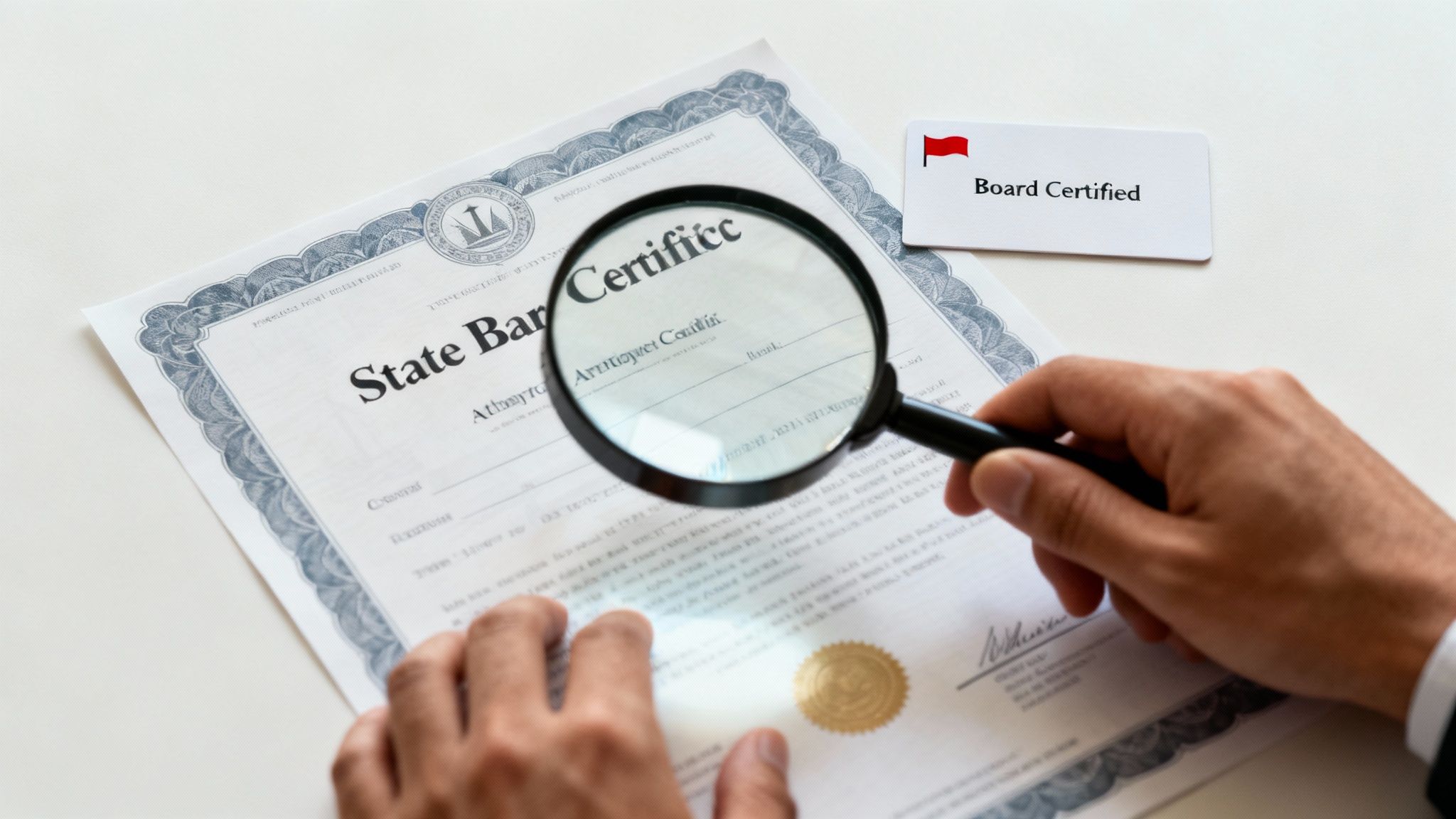When a Child Protective Services (CPS) caseworker knocks on your door, your world can feel like it's shattering. The hours and days that follow are a blur of confusion, fear, and a heavy sense of uncertainty that weighs on not just you, but your entire family. In these critical moments, especially if criminal allegations are involved, the single most important move you'll make is choosing the right legal representation. This isn't just about "getting a lawyer"—it's about finding a strategic partner who understands the deep connection between CPS cases and criminal law in Texas and can start protecting your family today.
Picture a family getting that dreaded phone call. A misunderstanding or a false report has led to a CPS investigation, and now there are whispers of criminal charges like "injury to a child." Panic sets in. What do you do? Who do you call? This is a moment where the right attorney doesn't just offer legal advice; they provide immediate, calming direction grounded in Texas law.
When you're choosing a criminal defense attorney for a CPS-related matter, you are selecting someone to stand between you and the full force of the State of Texas. You need a strategic partner with a proven history in cases where family law and criminal defense intersect, and a solid reputation in the local courts. Your first step should be to zero in on lawyers who can immediately protect your rights, navigate both the CPS and criminal justice systems, and lay out a clear, proactive defense plan from day one.
Your First Move After a Texas Criminal Charge
A strong defense doesn't start on your first court date—it begins the second you are aware of an investigation. The right attorney can take immediate, decisive action to manage the situation, advise you on how to interact with CPS investigators to protect your rights, and start building a defense before the prosecution even has its file organized.
Immediate Criteria for a Strong Defense
Here’s what to look for right out of the gate:
- Verifiable Experience in CPS & Criminal Law: You need an attorney with a proven track record defending against the specific charge you're facing, particularly when it originates from a CPS case. Their direct experience is non-negotiable.
- Local Court Knowledge: An attorney who is a regular in the county courthouse where your case is filed brings a huge advantage. They know the prosecutors, they know the judges, and they understand the local procedures that can make or break a case.
- A Clear Path Forward: A good lawyer should be able to walk you through the initial steps and explain what to expect. Just understanding the early stages of a CPS case under Texas Family Code Chapter 262 or what happens at an arraignment hearing can replace that feeling of panic with a sense of control.
The goal is to move from a state of crisis to having a proactive plan. Your attorney should be able to clearly outline the next 24-48 hours, detailing exactly how they will start protecting your parental rights and preparing your defense immediately.
This is what an effective defense truly looks like in action. For that family dealing with the shock of a CPS investigation, it means having a lawyer who immediately gets to work advising them on their rights during interviews and home inspections, and who starts scrutinizing every detail of the allegations. It’s all about taking control of the narrative from the very beginning.
Quick Guide to Attorney Qualities
When you're under pressure, it's easy to get overwhelmed by options. This table breaks down the essential qualities you should be looking for in a Texas criminal defense lawyer specializing in CPS cases. Think of it as your cheat sheet for making a smart, informed decision when it matters most.
| Essential Quality | Why It Matters for Your Case |
|---|---|
| Specialization in CPS & Criminal Law | You need an expert who understands how a CPS case can lead to criminal charges and how to defend both simultaneously. |
| Local Courtroom Experience | Knowing the local players—judges, prosecutors, court staff—is an invaluable strategic advantage. |
| A Clear, Proactive Strategy | They should explain their initial game plan for both the family and criminal court systems in a way you can understand. |
| Transparent Fee Structure | No surprises. You should know exactly what you're paying for and what the costs cover from the start. |
| Responsive, Compassionate Communication | Your lawyer should be accessible and keep you informed. You shouldn't have to chase them down for updates on your family's future. |
Finding an attorney with these qualities isn't just about hiring legal help; it's about securing a dedicated ally who will fight for the best possible outcome for you and your family.
Private Attorneys vs Public Defenders in Texas
When you’re facing criminal charges in Texas, especially those stemming from a CPS investigation, one of the first and most important decisions you’ll have to make is who will stand beside you in court. The choice between hiring a private attorney or working with a public defender is a big one, and it’s surrounded by a lot of myths and misunderstandings.
Let's get real for a moment. This isn't just a legal choice; it's a deeply personal one. I've seen families wrestling with this, weighing their savings against the need for a dedicated legal defense to keep their family together. It’s a gut-wrenching calculation. This isn’t about stereotypes—it’s about understanding the practical realities of how the system works.
Understanding the Key Differences
Public defenders are hardworking, skilled lawyers who are in the criminal courts every single day. They know the system inside and out. But here's the reality: they are often buried under incredibly high caseloads. This can severely limit the one-on-one time they can give to any single person's case. Their resources, which come from the state, can also be stretched pretty thin.
A private attorney, on the other hand, works for you. You hire them directly. This means they have full control over their caseload and can dedicate significantly more time and personal attention to building your defense. A private attorney focused on CPS-related criminal cases can also represent you in the family court proceedings, ensuring a consistent and coordinated strategy—something a public defender cannot do.
The biggest difference often boils down to one word: capacity. While both public defenders and private attorneys are committed to their clients, a private firm's ability to limit its caseload allows for a much deeper, more detailed focus on your specific defense strategy across both legal arenas.
How Representation Affects Case Outcomes
The kind of lawyer you have can make a real difference in how your case unfolds, especially when the goal is not just avoiding jail but achieving reunification with your children under Texas Family Code Chapter 263. The research backs this up. While conviction rates might look similar on paper, there's a telling gap in the outcomes.
For example, defendants with public defenders have historically been more likely to face incarceration—88% in federal court compared to 77% for those with private attorneys. This often suggests that a private lawyer may have more time and resources to negotiate plea deals that avoid jail time and protect parental rights. You can dig into the full report from the Bureau of Justice Statistics on defense counsel representation.
This decision tree gives you a good visual of the key things to look for—experience, local knowledge, and strategy—when picking your lawyer.

No matter which path you take, those three elements are the bedrock of a solid defense.
Ultimately, the choice is yours. If you can't afford a private attorney, you have a constitutional right to a lawyer, and a public defender will be appointed to fight for you in the criminal case. But if your family has the means, hiring a private attorney brings a level of focused attention, coordinated strategy, and resources that can be a powerful tool in protecting your freedom and your family.
How to Find and Vet Potential Lawyers

Finding the right attorney starts with smart, focused research. It's easy to feel overwhelmed, but breaking the process down into manageable steps turns a mountain of a task into a structured, proactive search for the best advocate for your family.
Your first goal is to build a shortlist of qualified candidates. This isn't about finding the flashiest website or the lawyer with the most billboards. It’s about identifying professionals with a proven history of success in cases just like yours, right here in the local Texas courts.
Where to Start Your Search
Begin with trusted, official sources to make sure you’re only looking at credible, licensed attorneys. Good starting points include:
- The State Bar of Texas: This is the official directory for every licensed attorney in the state. You can verify that a lawyer is in good standing and see if they have any public disciplinary history.
- Legal Directories: Reputable sites like Avvo and Martindale-Hubbell offer profiles, client reviews, and peer ratings that can give you a much broader picture of an attorney’s reputation.
- Board Certification: Keep an eye out for attorneys who are Board Certified in Criminal Law by the Texas Board of Legal Specialization. This is a mark of true expertise and a high level of experience that only a small fraction of lawyers achieve.
Once you have a few names, it’s time to dig deeper. Read through online reviews and client testimonials, but do it with a critical eye. Look for patterns in what former clients say about communication, strategy, and results, especially from other parents who have faced CPS. These stories can give you a real feel for what it’s like to work with that attorney. To better evaluate a lawyer's online presence, consider learning how law firms develop their brand and public image, which influences how they are perceived by potential clients.
Zeroing In on Relevant Experience
Finding the right lawyer means filtering your search to match the specifics of your case. With about 1.33 million active attorneys in the U.S., you need an expert, not a generalist. The Texas legal market is huge, but quality and experience vary dramatically from one firm to the next.
The single most important factor is an attorney’s direct, relevant experience with your specific charge in your specific county, especially when it is tied to a CPS investigation. An expert in Harris County DWI cases may not be the best choice for a Montgomery County assault charge stemming from a CPS report. Local knowledge is a massive advantage.
An attorney who regularly practices in the court where your case will be heard knows the local prosecutors and judges. They understand the unwritten rules and tendencies that can shape plea negotiations and trial strategies. This insider knowledge can be invaluable, especially when looking for opportunities for how to get criminal charges dropped while simultaneously working toward family reunification.
As you build your shortlist, prioritize lawyers who can demonstrate a clear history of handling cases at the intersection of criminal defense and family law in your courthouse. This focused approach will lead you to the most qualified candidates and put you in the strongest position to protect your future.
Asking the Right Questions in a Consultation

Think of the initial consultation as less of a meet-and-greet and more of a job interview—where you’re the one doing the hiring. This is your chance to really dig in and figure out who is going to be standing between your family and the State of Texas.
Walking into this meeting prepared with sharp, specific questions changes the entire dynamic. It’s no longer a sales pitch. It becomes a fact-finding mission to gauge an attorney's actual experience, their strategic mind, and how they’ll communicate when your family’s future is on the line.
Lots of folks get hung up on the cost right away, but the most valuable answers have nothing to do with fees. They reveal competence and compassion. Instead of asking generic questions that get you a canned response, you need to understand how they’d handle your specific situation. Are they a real strategist, or are they just running a playbook?
Questions About Experience and Strategy
A lawyer’s track record is a pretty good indicator of what they can do. But you have to ask questions that cut to the heart of their relevant experience, especially when it comes to the specific Texas courts you’ll be dealing with.
- Don't Ask: "Have you handled cases like mine before?"
- Instead Ask: "Can you walk me through your experience defending parents against criminal allegations that started with a CPS investigation in Harris County? How does the criminal case impact the family court case, and what is your strategy for managing both?"
That second question demands a detailed answer. It forces them to reveal their local knowledge and how they think on their feet. Any seasoned Texas attorney should be able to talk about the tendencies of local judges and prosecutors without missing a beat.
You should also probe for their initial thoughts on a defense. You’re not fishing for a guarantee—in fact, any lawyer who promises a specific outcome is throwing up a massive red flag. What you're looking for is a window into their process and their understanding of your ultimate goal: protecting your rights and reuniting your family.
A strong attorney won't just tell you what they'll do; they'll explain why. They should be able to sketch out a potential defense strategy that addresses both the criminal charges and the CPS service plan, giving you an honest take on the strengths and weaknesses of your case as they see it.
Questions About Communication and Case Management
How an attorney and their firm communicate is just as critical as their courtroom skills. When you’re under the stress of a criminal charge and the potential loss of your children, the last thing you need is an advocate who leaves you in the dark. Use the consultation to set clear expectations from day one.
Get a feel for their workflow by asking things like:
- Who will be my main point of contact? Is it the lawyer you're meeting with, or will your case get passed off to a junior associate or a paralegal?
- What’s your firm's policy for returning calls and emails? Knowing their typical response time can save you a world of anxiety later on.
- How will I be kept in the loop on my case? Will you get regular check-ins, or will you only hear from them when there’s a major development?
These questions get to the practical, day-to-day reality of what it's like to work with them. Their answers tell you a lot about their professionalism, whether their firm is overloaded, and how much personal attention you can realistically expect. Leaving that first meeting with clarity on these points is absolutely essential.
Spotting Red Flags Before You Hire

You’ve sat through the consultations, taken your notes, and now it’s decision time. This is the moment to step back, take a breath, and evaluate everything with a clear head. It’s a mix of trusting your gut and verifying the facts. With your family’s future hanging in the balance, you need to be absolutely certain you’re seeing signs of real expertise—and not missing the red flags that signal trouble.
Before you sign a contract, do your own quick background check. It's simple. Head over to the State Bar of Texas website and look up the attorney. You can confirm they're licensed and in good standing in minutes. More importantly, this search will show any public disciplinary history. That’s a major red flag you can't afford to miss.
Verifying True Expertise
In Texas, one of the clearest indicators of an elite criminal defense lawyer is Board Certification in Criminal Law. This isn't just a fancy title. It's a hard-earned distinction held by a small fraction of attorneys who've proven their extensive, hands-on experience and passed an incredibly tough exam. For a CPS-related case, finding an attorney with this certification who also has deep experience in family law is a powerful combination.
Finding a Board Certified attorney tells you you're dealing with a genuine specialist, not a jack-of-all-trades who just happens to take criminal cases.
Think of it this way: You're choosing between two lawyers. Lawyer A is Board Certified, hands you a straightforward flat-fee agreement, and walks you through a realistic strategy for both your criminal and family law cases. Lawyer B talks a big game, guarantees he can get the case dismissed, but gets cagey when you ask about costs. The choice is obvious. Professionalism and transparency aren't just nice to have; they're a preview of how your entire case will be handled.
This isn't just a local problem; it’s a global one. The World Justice Project found that a staggering 1.4 billion people across the globe can't get the legal help they need. This statistic really puts into perspective how critical it is to make a smart choice when you do have options. The quality of your lawyer directly impacts the quality of justice you receive. You can read more in these global insights on access to justice.
Critical Warning Signs to Avoid
As you make your final call, stay alert for behaviors that should send you running for the door. These aren't minor quirks; they are serious red flags that mean you should walk away, no questions asked.
Be extremely wary of any lawyer who:
- Guarantees a specific outcome. No ethical attorney can promise you a dismissal or a "not guilty" verdict, especially when dealing with the complexities of CPS involvement. Anyone making these kinds of guarantees is using a high-pressure sales tactic, plain and simple.
- Is unclear about fees. If you leave a meeting confused about the retainer, hourly rates, or other potential costs, that confusion will only get worse. Insist on a transparent, written fee agreement before you pay a dime.
- Exhibits poor communication early on. If they’re slow to return your calls or seem disorganized before you've even hired them, imagine what it will be like once they have your money. That's a preview of the service you'll be getting for the entire case.
Trust is the bedrock of the attorney-client relationship. If at any point you feel pressured, ignored, or more confused than when you started, keep looking. The right lawyer will give you confidence and clarity, not more anxiety.
Common Questions About Hiring a Defense Attorney
Finding the right legal help in Texas can feel like navigating a minefield, especially when your family is at risk. When you're stressed and unsure of what to do next, questions start piling up fast. Getting clear, straightforward answers is the first step toward feeling like you're back in the driver's seat. Here are some of the most common things people want to know when it's time to hire a criminal defense attorney for a CPS matter.
How Much Does a Good Criminal Defense Attorney Cost in Texas?
This is usually the first question on everyone's mind, and the honest answer is: it really depends. The price tag is shaped by a few key things, like how complex your case is, how much experience the lawyer has, and whether they are handling both a criminal and a family law case.
Many defense lawyers in Texas work on a flat fee basis, which means you pay one set price to cover the entire case from start to finish. Others might charge by the hour, and that can run anywhere from $200 to over $750 per hour.
Always—and I mean always—ask for a detailed fee agreement in writing. It should spell out exactly what that initial retainer covers and list any other potential costs, like fees for private investigators or expert witnesses. Be wary of lawyers with suspiciously low prices; that can sometimes be a red flag for inexperience or a sign that your case won't get the attention it deserves.
Should I Hire a Lawyer Who is a Former Prosecutor?
Hiring an attorney who used to be a prosecutor can be a huge strategic plus. They’ve been on the other side, so they know the prosecution's playbook inside and out. That firsthand knowledge helps them spot weaknesses in the state's case and anticipate their next move.
On top of that, they often have established relationships at the courthouse, which can be a real asset when it comes time for negotiations.
But that "former prosecutor" title isn't the only thing that matters. The most important factors are their specific track record in criminal defense for CPS-related cases, their history of getting good results for clients, and whether you genuinely trust them. This experience is also vital after a case is over, especially when you need help with post-conviction options like learning how to get a criminal record expunged in Texas.
What if I Cannot Afford a Private Attorney?
No matter your financial situation, you have a constitutional right to a lawyer for a criminal charge. If you truly cannot afford to hire a private attorney, you can ask the court to appoint one for you. You'll have to prove to the judge that you are indigent, which means you don't have the financial means to pay for your own legal counsel.
Once approved, the court will appoint a lawyer from the public defender's office or from a list of private attorneys who accept appointed cases. While a public defender will fight for you in criminal court, they will not be able to represent you in the family court case against CPS. This is a critical reason why, if at all possible, hiring a private attorney who can manage both cases is a significant advantage for Texas parents.
Facing a CPS investigation and criminal charges can feel isolating and overwhelming, but you do not have to go through this alone. The right legal team will not only defend you in court but will also provide the guidance, compassion, and reassurance you need to navigate this difficult time. If your family is in this situation, reach out to an experienced attorney who understands both sides of this complex legal battle. We are here to listen to your story, explain your rights, and build a strategy to protect your future and keep your family together. Contact the Law Office of Bryan Fagan today for a free, confidential consultation.




